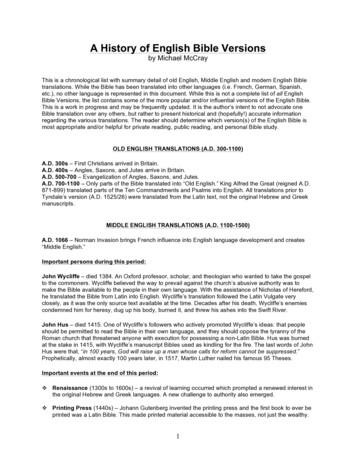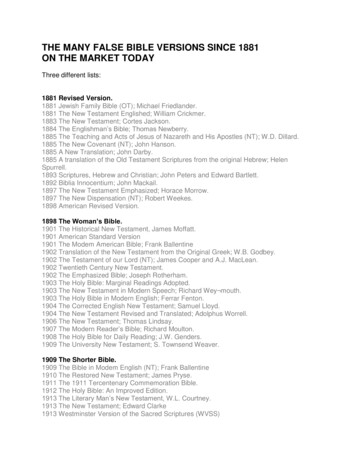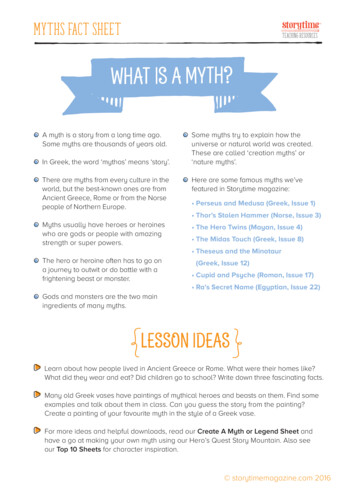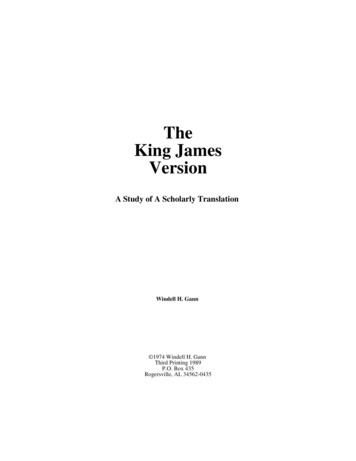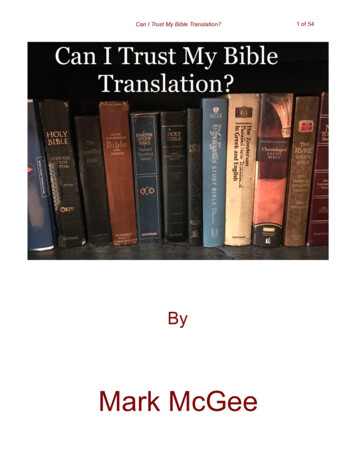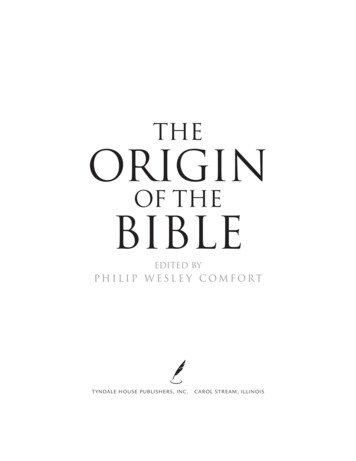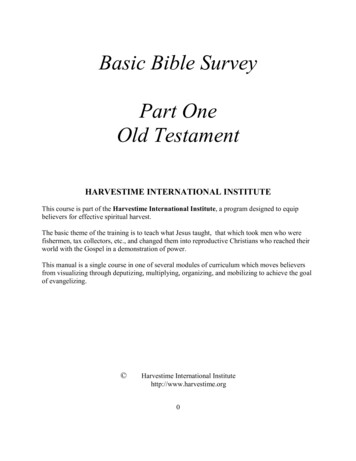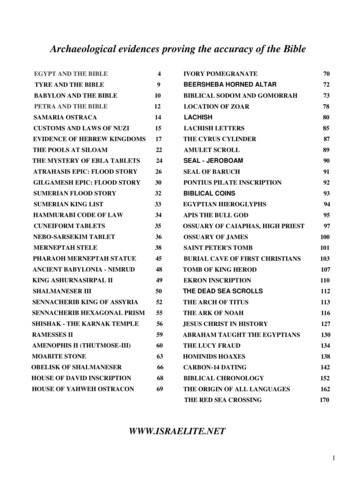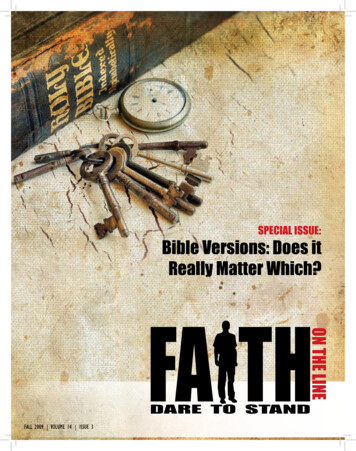
Transcription
SPECIAL ISSUE:Bible Versions: Does itReally Matter Which?ON THE LINEFA THDARE TO STANDFALL 2009 VOLUME 14 ISSUE 3
EDITOR’S CORNERIn July 2009, Pastor David Allendistributed a public statement of rebuttal toWalter Veith’s two DVDs on the subject ofnew Bible versions. In his statement, Allenoffered those interested a 41-page documentoutlining all the arguments against Dr. Veith’spresentations. Neither the short statement northe full document were ever sent to Walter Veithor Amazing Discoveries for comment.Our aim is to urge men andwomen to stand for truth andresist error. We pray that intimes of serious compromiseour ministry will equip youwith solid information oncurrent end-time issues andtrends, and encourage you tolive a life apart from worldlyinfluences.Volume 14 Issue 3Faith on the Line is publishedquarterly by Amazing DiscoveriesManaging EditorWendy GoubejUnfortunately, this debate over the newBible versions is not new. We have receivedmuch opposition on this subject. New Bibleversion advocates feel that the discussionof the authenticity of the NIV is an attack onsomething very personal—their understandingof and relationship with God.New version advocates believe that in thoseverses where something is missing, theinformation can be found elsewhere. Also,many contend that the changes found in thenew versions are insignificant, fix an error, orare meant to make the meaning clearer.Design & LayoutJerick ArceoHowever, in the article that follows, whichalso stands as Walter Veith’s reply to DavidAllen’s rebuttal, we see that the argument isnot about removing redundancy or clearing upthe meaning. Rather, this is a discussion aboutthe history of the Bible, the authenticity of thesource text, and the intentions, beliefs, andpractices of not only the translators, but also theRoman system and its Counter Reformation.Throughout the history of the Church and theBible, an unmistakable battle has been ragingaround the Word of God. Many voices are risingto drown out the truth of the Bible’s clear andpointed warnings.Tel604-572-9457Toll Free: 1-866-572-9457Contributing WritersRudy Davis, Victor Gill,Jean Handwerk, Keith King,Brian Neumann, Walter VeithContactPO Box 1897101C - 120th StDelta BC V4E 2A9CanadaPO Box 4480Blaine WA98231- azingdiscoveries.orgSubscription 20/yr for US and Canada 30/yr for InternationalCopyright 2009 Amazing Discoveries.Articles reflect the opinion of their authors.Permission to quote excerpts is grantedwhere credit is given.FA THON THE LINEWho will we listen to?Copy EditorCailey BennettD A R E T O S TA N D2
ON THE LINEFA THSPECIAL ISSUEFALL2009D A R E T O S TA N D#213B - Battle of the BiblesOur battle is not against flesh and blood. Spiritual forces wantto rob us of the only source of inspiration outlining the road tosalvation: God’s Word. Battle of the Bibles will show you howthe Enemy is preparing for the final attack on the Word of Goditself.This DVD exposes those who have reshaped God’s Wordto suit their occult philosophy, and includes an examination ofBible versions and their sources.The battle of the Bibles is more than a version issue. It isa manuscript issue. This DVD discusses the reliability of theancient manuscripts that shaped the Bible versions we seetoday. Time: 91 min DVD 14.00#214B - Changing the Word Parts 1-3This DVD, a near exhaustive comparison of modern Bibleversions with the King James Version, shows how blatantchanges in modern translations are meant to hide the truthabout Christ’s deity. Time: 134 min DVD 14.003
Editor’s Note: This letter is in response to a critique by Elder David W. Allen of Walter Veith’s DVD #213 Battle of theBibles and #214 Changing the Word. A sample of the critique was distributed publicly by Elder Allen at the BC Campmeeting in 2009. Elder Allen invites anyone interested in examining his full 41-page critique to obtain a copy throughthe following avenues:Email: pastordaveallen@gmail.comTel: 360-574-4919Those interested in comparing his document with the information in this magazine are invited to obtain a copy fromhim directly.August 1, 2009My dear brother Allen,Greetings in the name of our Lord Jesus Christ and may God help us to be united inthe Spirit of love and truth through His Word. I have become aware of the documentyou sent out regarding my Bible lectures, and I feel that this needs a response. Apersonal communication from you would have been appreciated, but since this issue isnow in the public domain we will have to deal with it as such. After reading yourevaluation of my DVD lectures on the The Battle of the Bibles, I realize that weare approaching the transmission of Bible manuscripts and texts from two entirelydifferent paradigms.This situation reminds me of my former experience as an evolutionist. I was fullyconvinced that Darwinian evolution was true, because science had, or so I thought,proved it so. All the evidence was used to uphold and prove that we have evolved overmillions of years. How could all the thousands of scientists and trained professionalspossibly be wrong? But then I was confronted with the Biblical account of Creationand the fact that none of the scientists had been around at the time of the Big Bang.All their “proof” was based on interpretive assumptions which they use to uphold theirtheory. When I began to consider the possibility that God had created all things asthe Bible says, and when I began to see that all the assumed evidence for the moderntheory of evolution actually proved the Biblical Creation account, an entirely newparadigm opened to me.Elder Allen I have related this experience to you, because I believe that the samekind of interpretive assumptions are being used unintentionally, by Bible MSS textualcritics today who are influenced by inherited methods and principles in our ecumenicalclimate. The interpretation of history is very subjective. Historical evidence hasoften been used to prove two opposite positions from the same evidence.Protestants today have not only swallowed the Catholic Counter-Reformation teachingson prophecy hook, line, and sinker, but they are using the very manuscripts from Romethat the Protestant reformers and God’s people through the long Dark Ages of apostasyrejected. One little mentioned advantage of the KJV is that it was translated at atime when God’s people had just come out of those Dark Ages and knew the differencebetween Roman Catholicism and Protestantism. Today this is not the case, as modernecumenical evangelical Protestants return to Rome.Please don’t misunderstand me, I am not a ”King James Version only” advocate, but Iam a Byzantine (Received Text) only supporter. The KJV has many areas that can beimproved upon such as the archaic language and pertinent mistranslations of particularterms, but these factors concern semantics rather than doctrinal issues. The same, ofcourse, applies to the old Luther Bible and any old translation in any other language.The question we have to ask ourselves is whether we are dealing with a directtranslation that gives as accurate a rendition of the original words as possible, orare we dealing with a dynamic equivalent translation that places the original words ina new setting that often reflects the paradigms of the translators? In the latter casethe translation may turn out to be dynamic, but often anything but equivalent.In my study of the Bible and the Spirit of Prophecy, I have found that the inspiredaccount of the history of God’s people and His written Word, as found in the greatcontroversy theme between Christ and Satan opens to view the bigger picture of notonly Christ’s great battle with Satan, but also the great battle of God’s people topreserve the written Word and the true doctrines therein.Elder Allen, I believe that you have been following the current popular scholarly4
approach to textual criticism in the same way as I followed the popular scientificteachings of modern evolution. The conclusions that one is inclined to reach dependon one’s basic assumptions dictated by one’s paradigm. After all, modern biblicalcriticism is a post-reformation phenomenon and the question of who the harborers ofGod’s true Word are is thus vital to the outcome. Today, the modern translations arebased largely on the witness of the Vaticanus and Sianiticus texts (which come outof the Vatican stable) and a handful of uncials in juxtaposition to the cloud ofmanuscripts testifying to the opposite. The Vaticanus manuscript was the prime witnessto counter the Reformation Bible and the Sinaiticus adds its voice to form the bulwarkof the modern translations.Brother Allen, your long list of my amazingly absurd untrue outrageous statementsare not so absurd if you are willing to consider that there might just be an amazingdeception that Rome’s Counter-Reformation has introduced into the Protestant worldthrough the schools and universities since the Reformation. You also feel that,because I am “obsessed with berating Westcott and Hort,” I believe every one else hashad the same “evil intent” to “deliberately distort God’s Word.” This is not true!Westcott and Hort condemn themselves as recorded in their own writings and I merelyquoted what they said. Having said this, I do want to thank you for taking the time tocorrect any wrong statements I have made, as it is not my intent to mislead or deceiveanyone, but quite the contrary. In fact, it is because I believe that God has inspiredand preserved His Holy Word through His Church in the Wilderness and not through thecorrupt manuscripts and false doctrines from Rome that I am warning God’s people ofSatan’s subtle deceptions, which are intended to deceive the very elect.Never did I create, or wish to create, the impression that the Bible was nottrustworthy. After all, how could I possibly believe in the inspiration of the Biblewithout faith in the preservation of the Bible? Inspiration without preservation isuseless. That is why I believe that the same Word that sustained the early Church andfuelled the Reformation is the everlasting Word of God. It is still available today,intact with all the verses and therefore I would not deprive anyone of the Bible orfaith in the Bible. Moreover, this is not some new doctrine that I have thought up inorder to confront the Church. These issues have been in the public domain since theirinception and Adventist leaders and scholars have often been on the forefront of thisdebate.You say, “best Greek,” means from the manuscripts deemed to be the most reliable,.closest to the original text. But how do we determine what is closest to the originaltext, when we don’t have the originals? How do you determine which manuscripts aremost reliable? There are at least 50 old known apocryphal New Testament books thatprove that just because a manuscript is old, it is not necessarily the most reliable.The history of the Old Testament Apocrypha and why it was included in the SeptuagintGreek Alexandrian version and the early KJV is an interesting story. The HebrewScriptures did not include it in their canon and that is why the early ProtestantBible societies after 1800 excluded it from the Bibles they printed. Since then,Catholics have been trying to have them reintroduced into the modern translations butinformed Christians have never accepted it as part of the inspired writings of theBible.Enclosed is a document expanding on the issues under discussion.May our great God of peace be with you as we hasten together the great day of Hiscoming.Your brother in ChristWalter J. Veith5
OUR AUTHORIZED BIBLE VINDICATEDBENJAMIN G. WILKINSON, Ph. DTThe all-time bestseller. The most translated book.The most controversial title. The Bible.Throughout the ages this precious book has been both persecutedand preserved. Today, many question the inspiration of the Bible asthe Biblical fundamentals our society depends on crumble.Our Authorized Bible Vindicated was written to restore faith in thetrue, infallible word of God. With the lines blurring between true andfalse, there is a desperate need for usto return to the authentic roots of ourspiritual foundations. Satan is workingovertime so that, if it were possible, hewould deceive the very elect. FaultyBible translations draw minds away fromthe truth.Our Authorized Bible Vindicated exploresthe history of the Bible throughout thecenturies and how it has been preservedin its entirety untainted. The reader willbe led on a journey back to a solid beliefin the true word of God and how todiscern it from the false.Benjamin G. Wilkinson, PhD, worked asthe Dean of Theology at WashingtonMissionary College (now known asColumbia Union College). During hisyears of service to the cause he loved,he also dedicated his life to ministry andintensive study. Our Authorized BibleVindicated is the culmination of thisstudy. 15.006
Does it matterwhich BibleBible Versions:Walter J. VeithThe issue of Bible translationsis an issue of hot debate withadvocates on both sides of thedivide, pouring out publicationupon publication to defend theirparticularviewpoint.Thousandsofpages of evidence are brought to thesubject that seems to achieve nothingother than greater polarization. Oncedrawn into this debate, we end up ina vortex threatening to engulf us andit is tempting to throw up our handsin despair and ask: “Does it reallymatter?” Extreme views are of courseprevalent in all such debates, and sowe have our “King James Version only”advocates as apposed to our “NIVonly” advocates, both claiming thattheir version most accurately rendersthe original intent of God’s Word. I amreminded of one dear brother in myown country who stuck to his old highDutch translation of the Bible, saying,“If high Dutch was good enough forPaul, then it is good enough for me.”The King James Version (KJV) advocatewill point to the many verses missingand the numerous alterations andpartial omissions in the new versions.The advocates for the modern versionswill point to other passages of Scripturewhere the intent of the missing verses isstill present and proclaim that needlessrepetition has simply been removed.However, all these repetitions areprobably based on scribal errors, assome of the more ancient manuscriptsseem to verify. The modern versions falleasier on the ear and all this fuss aboutall these minor details merely detractsfrom the overall beauty of God’sWord. Biblical scholars who defendwe use?the new versions, however, base theirargument entirely on the “most ancientmanuscripts” which largely support themodern translations. Some of thesemanuscripts were only discoveredrecently, and are said to throw a wholenew light on the subject.When I became a Christian, I cameto know and understand the beautifulmessage of salvation in Christ throughthe NIV. Does it therefore matter whichversion I use? Martin Luther foundChrist in the Latin Vulgate and it ledhim to accept salvation in Christ. Doesit therefore matter what version heused? Wycliffe, the morning star of theReformation, translated the Vulgateinto English—it was never printed andcopies were few. Was God with him inthis venture? Did it matter what versionhe used? Tyndale and Martin Lutherlater translated the Bible from Erasmus’Greek text and gave the Word of Godto their respective countrymen in theirown mother tongue. Does it matterwhat version they used? Was Godwith them when they undertook thismonumental task? Does it matter?Did God make a mistake in firstpresenting the early reformers with thatto which they were accustomed, ordid he permit it until they were ready toreceive new light? “But the path of thejust is as the shining light, that shinethmore and more unto the perfect day”Proverbs 4:18.I believe that it does matter, but Ialso understand that no amount ofargument will convince either side.It will require a paradigm shift. I havealso come to realize that the issue ofBible manuscript translation can beapproached from two entirely differentperspectives, and these perspectiveswill determine one’s paradigm. I amreminded of my former experience asan evolutionist. I was fully convincedthat Darwinian evolution was true,because science had, or so I thought,proved it so. All the evidencepresented to us in my university careerconclusively upheld the evolutionaryparadigm and was presented withsuch conviction that there was noroom for doubt. The earth and the lifeit supported had evolved over millionsof years and every scientific disciplinewas in harmony with this belief. Afterall, how could all the thousands ofscientists and trained professional menin the world possibly be wrong?When I was convicted of the veracityof the Bible, however, all this changed.It was not a sudden change, becauseit required a huge paradigm shift inorder to even entertain the possibilitythat my evolutionary mindset was inneed of revision. It required nothingless than total detachment from myconvictions to even admit that allthe so-called proof for evolution wasbased on interpretive assumptions.The same data could, however, alsobe interpreted from a totally differentperspective and the conclusions thenreached could be in total harmony withthe Bible. The data had not changed,but the mindset had changed.I have also come to realize thatarguments from the facts alone willseldom convince the other side of this7
paradigm divide, because spiritualthings are spiritually discerned. Doesit matter how I view the data? Does itmatter whether I interpret it in the lightof God’s Word or naturalistically? Ofcourse it matters! I long for my atheistfriends to see things as I see them now,to get to know the Creator of all things,and the beauty of His character, andfor them to have the same hope thatI have now in place of the void thatled to nothing. Will they listen to thefacts? No! Something else needs tohappen; they need to be touchedby the Spirit of God before they willlisten and understand. Salvation is thusalways the work of God and neitherour knowledge nor articulate skillscan change the heart, lest we shouldboast.I believe that the same kind ofinterpretive assumptions are beingused by Bible manuscript (MSS)textual critics and scholars todayunintentionally as they are influencedby the inherited methods, assumptionsand principles of their discipline. Adiscipline that is shaped and mouldedby the ecumenical climate we livein. The interpretation of history is verysubjective and the same evidence hasoften been used to prove two exactopposite positions. Time is a greatequalizer, and age-old differencesand animosities are easily forgotten bysubsequent generations. History bookscan be rewritten and that which wasworth dying for in one generation canbe considered ludicrous or irresponsibleby subsequent generations. The sameapplies to the Bible. It is not only theveracity of the Bible which is at stake,or even its plainest teachings, but theauthenticity of the very manuscriptsfrom which it was derived are subject tothis debate. Protestants today have notonly swallowed the Catholic CounterReformation teachings on prophecy,hook, line, and sinker, but they arealso using the very manuscripts fromRome that the Protestant reformersand God’s people through the longDark Ages of apostasy rejected. Oneseldom mentioned advantage of theReformation Bibles is that they weretranslated at a time when God’s peoplehad just come out of the Dark Agesand knew the difference betweenRoman Catholicism and Protestantism.8Today this is not the case, as modernecumenical evangelical Protestantsreturn to Rome.To look at the arguments from a “KJVonly” perspective or “my favouritemodern day version only” perspectiveis, in my view, far too narrow a view totake. Translations are based on ancientmanuscripts, and the question shouldrather be—which ancient manuscriptsare the representation of God’sWord? Is it the Western, Alexandrian,or Byzantine manuscript that mostaccurately portrays what God reallydid say? In my study of the Bible andthe Spirit of Prophecy, I have found thatthe inspired account of the history ofGod’s people and His written Word, asfound in the great controversy themebetween Christ and Satan, opens toview the bigger picture of not onlyChrist’s great battle with Satan, butalso the great battle of God’s peopleto preserve the written Word and thetrue doctrines therein.The 12th chapter of Revelation opens tous a panoramic view of the entire historyof the great controversy betweenChrist and Satan from its beginning inheaven to its end on earth. The Wordof God is central in this battle betweengood and evil and it is just as vital nowas it was in the Garden of Eden to knowwhat God really did say. The enemytoday is that same wily foe who twistedthe Word of God then to say what Godabsolutely did not say and who alsotwisted the messianic prophesies at thetime of the first Advent to strip them ofall their authority and power regardingthis life saving subject. In that timelessclassic on the life of Christ The Desire ofAges, Ellen White sums up this strategyof Satan as follows:When God’s written wordwas given, Satan studied theprophecies of the Saviour’sadvent. From generation togeneration, he worked toblind the people to theseprophecies, that they mightreject Christ at His Coming.Many among Christ's hearerswho were dwellers at Jerusalem,and who were not ignorant ofthe plots of the rulers againstHim, felt themselves drawn toHim by an irresistible power.The conviction pressed uponthem that He was the Son ofGod. But Satan was ready tosuggest doubt; and for this theway was prepared by theirown erroneous ideas of theMessiah and His coming.The very words of prophecywere so perverted as tosanction error.Many are deceived todayin the same way as were theJews. Religious teachers readthe Bible in the light of their ownunderstanding and traditions;and the people do not searchthe Scriptures for themselves,and judge for themselves as towhat is truth; but they yield uptheir judgment, and committheir souls to their leaders. Thepreaching and teaching of Hisword is one of the means thatGod has ordained for diffusinglight; but we must bring everyman's teaching to the test ofScripture. DA115, 457, 458, 459Darkening the understanding of whatGod really did say is one strategy thatyielded fruits of disobedience andignorance in the past, as it is doing evento this day. Modern society choosesto ignore or twist even the plaineststatements of Scripture regarding thequestions of origins or the many socialissues ranging from pro-choice lobbiesto gay rights which are so central tomodern society. The debates cut acrosspolitical and ecclesiastical divides withas many opinions as there are groupsto defend them. It does not seem tomatter what God really did say, it onlymatters what we think He meant whenHe said it. A somewhat more slipperyroad is when we come to the point ofdenying that God said it at all or sayingthat perhaps it was a scribal error oreven a deliberate insertion. After all,if one would wish to pervert Scripture,then deliberate changes to the Wordof God would seem an obvious way togo. Where, however, does this leavethe believer who wishes to place histrust in the Word of God? Faith in theWord of God necessarily also implies
faith in the preservation of the Word,because one without the other is afoundation built on sand.God cannot expect obedience to HisWord if that Word is not available to us.It is therefore essential that Scripturemust have been preserved by Him inan uncorrupted form in order for us tocomply with its demands. Moreover,should deliberate changes have beenintroduced into certain manuscripts,then a distinct line of demarcationmust exist between corrupt and purelines of manuscript lineages. Duringthe “falling away” period following thetime of the apostles and the 1260 yearsof papal supremacy, every phase ofheresy had been introduced into theChurch. Ellen White describes how Godpreserved His Word during this periodof apostasy and who the guardians ofthat Word were:Satan had urged on the papalpriests and prelates to burythe Word of truth beneaththe rubbish of error, heresy,and superstition, but in a mostwonderful manner it waspreserved uncorrupted throughall the ages of darkness. The faithwhich for centuries was heldand taught by the WaldensianChristians was in markedcontrast to the false doctrinesput forth from Rome. Theirreligious belief was foundedupon the written word of God,the true system of Christianity.But those humble peasants,in their obscure retreats, shutaway from the world, andbound to daily toil among theirflocks and their vineyards, hadnot by themselves arrived atthe truth in opposition to thedogmas and heresies of theapostate church. Theirs wasnot a faith newly received.Their religious belief was theirinheritance from their fathers.They contended for the faithof the apostolic church, .”thefaith which was once deliveredunto the saints.” (Jude 3)The church in the wilderness,and not the proud hierarchyenthroned in the world's greatcapital, was the true churchof Christ, the guardian of thetreasures of truth which God hascommitted to His people to begiven to the world GC 64, 69.The Waldenses were among thefirst of the peoples of Europe toobtain a translation of the HolyScriptures. Hundreds of yearsbefore the Reformation theypossessed the Bible in manuscriptin their native tongue. Theyhad the truth unadulterated,and this rendered them thespecial objects of hatred andpersecution. They declaredthe Church of Rome to bethe apostate Babylon of theApocalypse, and at the perilof their lives they stood up toresist her corruptions. While,under the pressure of longcontinued persecution, somecompromised their faith, littleby little yielding its distinctiveprinciples, others held fastthe truth. Through ages ofdarkness and apostasy therewere Waldenses who deniedthe supremacy of Rome, whorejected image worship asidolatry, and who kept the trueSabbath. Under the fiercesttempests of opposition theymaintained their faith. Thoughgashed by the Savoyard spear,and scorched by the Romishfagot, they stood unflinchinglyfor God's word and His honorGC 65.2.By the Spirit of Prophecy EllenWhite further says, “I saw thatGod had especially guardedthe Bible; yet when copies of itwere few, learned men had insome instances changed thewords, thinking that they weremaking it more plain, when inreality they were mystifying thatwhich was plain, by causingit to lean to their establishedviews, which were governedby tradition EW220.This changing of the Word wasundertaken by the likes of Origen,Eusebius, and Jerome in the fourthcentury, and today learned scholarsare again changing the words of theBible, thinking that they are making itmore plain. In reality, they are mystifyingthat which was plain by causing it tolean to their established views. EllenWhite writes this:While Luther was opening aclosed Bible to the peopleof Germany, Tyndale wasimpelled by the Spirit of Godto do the same for England.Wycliffe's Bible had beentranslated from the Latin text,which contained many errors.It had never been printed,and the cost of manuscriptcopies was so great thatfew but wealthy men ornobles could procure it, and,furthermore,beingstrictlyproscribed by the church, ithad had a comparativelynarrow circulation. In 1516, ayear before the appearanceof Luther's theses, Erasmus hadpublished his Greek and Latinversion of the New Testament.Now for the first time the Word ofGod was printed in the originaltongue. In this work manyerrors of former versions werecorrected, and the sense wasmore clearly rendered. It ledmany among the educatedclasses to a better knowledgeof the truth, and gave a newimpetus to the work of reform.But the common people werestill, to a great extent, debarredfrom God's Word. Tyndalewas to complete the work ofWycliffe in giving the Bible tohis countrymen GC88 245.1.9
Wycliffe did not have the Greekmanuscripts from which to translatehis Bible, so he used the Latin Vulgateas his source which “contained manyerrors.” Did God make a mistake whenHe inspired Wycliffe to translate theBible from a flawed text? I believe not.The time had come to instill a hungerfor the Word of God in the minds ofthe people. The art of printing had notbeen invented in the time of Wycliffe,and so copies had to be preparedby painstaking copying the originaltranslated work. Thus only a very limiteddistribution could be achieved, but thisvery condition created the hunger andprepared the way for that which was tofollow. Which Word did Tyndale give tohis countrymen to complete the workthat Wycliffe began? Was it not theReceived Text, as the Greek translationof Erasmus came to be known, whichhe used as the basis for his translation?The art of printing had only just beeninvented and the printing presses werechurning out the writings of Luther andthe other Reformers to light a fire thatconsumed the dross of superstitionand darkness which permeated theDark Ages. Was this not the work thataroused the ire of Rome? Did this notlead to war and bloodshed even to thepoint of sending the Spanish Armadato halt the work?The doctrines of Rome could notstand the scrutiny of the Word ofGod, and when it was available in thenative tongue of the people, even aploughman could know more of theWord of God than prelates and Popeswho were concerned more with lovefor power than the power of love. Warand bloodshed could not prevail, and itwas obvious to all that Rome was at warwith the Word of God itself. To escapethis stigma, Rome proclaimed that itwas not the Word they were warringagainst, but the “faulty Protestantversion” of that Word that they wereopposed to. The Jesuits were assignedto write the Roman counter Bible whichbecame known as the Douay Version.The Douay was based on Jerome’sVulgate and the Vaticanus manuscript,which both find their origin in the 4thcentury, the century of apostasywhen every wind of doctrine wasbrought into the Church. Regardingthe stealthful progress of apostasy in10the early Church and the events of
Bible versions is not new. We have received much opposition on this subject. New Bible version advocates feel that the discussion of the authenticity of the NIV is an attack on something very personal—their understanding of and relationship with God. New version advocates bel

